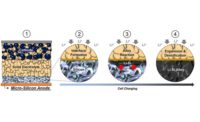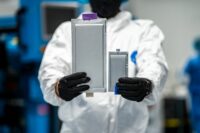YOKOHAMA, Japan—Engineers at Nissan Motor Co. believe solid-state batteries will power next-generation electric vehicles by the end of this decade. To help achieve that goal, the automaker recently opened a prototype production facility for laminated all-solid-state battery cells at the Nissan Research Centere.
Under its Nissan Ambition 2030 initiative, the company plans to launch an EV with solid-state batteries developed in-house by 2028. In two years, it expects to ram up a pilot assembly line at its Yokohama Plant, with materials, design and manufacturing processes to be studied at the prototype production facility.
Solid-state batteries are expected to be a game-changing technology for accelerating the popularity of EVs. They have an energy density approximately twice that of conventional lithium-ion batteries, significantly shorter charging time due to superior charge-/discharge performance, and lower cost due to less expensive materials.
"[We have been a leader in electrification technology through a wide range of activities, from molecular-level battery material research to the development of safe, high-performance EVs,” says Kunio Nakaguro, executive vice president in charge of R&D at Nissan. “The knowledge gained from our experience supports the development of all-solid-state batteries and we’ve accumulated important elemental technologies.
“Going forward, our R&D and manufacturing divisions will continue to work together to utilize this prototype production facility and accelerate the practical application of all-solid-state batteries,” claims Nakaguro.
According to Nakaguro, solid-state batteries will be reduced to $75 per kilowatt hour by 2028 and to $65 per kWh thereafter, placing EVs at the same cost level as gasoline-powered vehicles.



